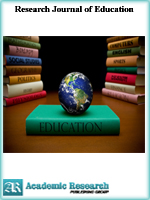Research Journal of Education
Online ISSN: 2413-0540
Print ISSN: 2413-8886
Print ISSN: 2413-8886
Quarterly Published (4 Issues Per Year)

Archives
Volume 2 Number 8 August 2016
Comparison of Open Class and Reflection Session in the Implementation of Lesson Study between Japan and Malaysia
Authors: Nuraini Abu Bakar ; Zanaton H Iksan
Pages: 137-144
Abstract
The Lesson Study approach is one of the latest efforts in improving the quality of education in Malaysia.The success of Lesson Study in Japan has inspired us to adapt this approach to the education system of Malaysia. By 2015, the Ministry of Education Malaysia has implemented the approach through the Professional Learning Community (PLC) programme in almost every schoolwith the aimof enhancing the quality of education. The learning community contributes a big impact in the lesson study approach by collaborating, discussing and reflectingin order to improve the development of the teaching and learning process. Since the implementation of Lesson Study in Malaysia is still at an early stage compared to Japan, this article therefore aims to focus on explaining how the implementation of open class and reflection had been carried out in Japan. From the observation of open class and reflection during a school visit inJapan, it is found that they have organised a public open class which involved every class in the school for at least once a year. In addition, a few factors have been identified to enhance the effectiveness of the procedures: a) focused observation, b) complete equipment and team for recording c) committed observer. The reflection session was carried out thoroughly and was very detailed.
A Survey of Sanitation and Hygiene Facilities in Public and Private Primary Schools for Effective Implementation of Ube Programme In Onitsha, Anambra State
Authors: Nwankwo, I. N. ; Uzoechina, G. O. ; Oguegbu, A. E.
Pages: 129-136
Abstract
This paper surveyed the availability of sanitation and hygiene facilities as well as the sanitation and hygiene practices among public and private primary schools in Onitsha, Anambra State. Two research questions guided the study. The study adopted descriptive survey research design. The population of the study comprised 97 and 71 public and private primary schools in the Area respectively. A sample of 48 primary schools consisting 27 public and 21 private was used. The proportionate stratified random sampling technique was used for sampling. A checklist was used to obtain data for question 1 while a researcher developed questionnaire adapted from Implementation Guidelines on National School Health Programme 2006 of the Federal Ministry of Education was used to gather data for research question two. The instrument was validated by three experts. Percentage score and statistical Mean score were used to answer research question one and two respectively. It was found that sanitation and hygiene facilities such as waste bins, water supply, toilet etc are lacking among public and private primary schools in Onitsha Area and that the primary schools are yet to embrace sanitation and hygiene practices hence pupils still defecate in the bush among others. It was recommended among others that Government, proprietors and teachers should take urgent steps to provide sanitation facilities to the schools and pupils should be taught rhymes, poems and plays that promote sanitation and hygiene.



